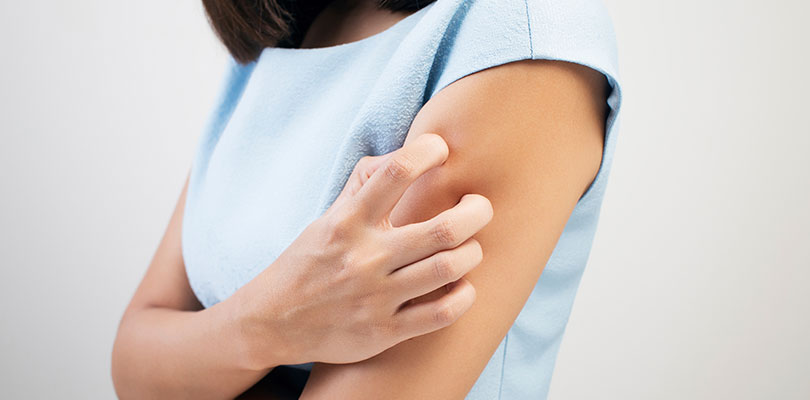Photo Credit: s-dmit / iStockPhoto.com
How to Protect Yourself When Caring For Your Child
Chickenpox, caused by the Varicella-Zoster virus, is extremely contagious — in fact, it spreads to others in about 90 percent of cases. The virus causes a very itchy rash with fluid-filled blisters (vesicles) popping up all over the skin. The severity of the rash and the number of vesicles varies between individuals; some may have only a few vesicles while some may have as many as 2,000.
Chickenpox most commonly occurs in children and typically clears up in five to 10 days. In normally healthy children, it usually causes mild fever, feeling unwell, headache, and a very itchy rash.
The most common complication of chickenpox is bacterial infection of the vesicles, which occurs when they are scratched, allowing bacteria from the skin to enter the wound and form a pus-filled boil. This can lead to enlarged lymph nodes in the local area and can also cause scarring.
In rare circumstances, the virus may cause illness in other areas of the body. The most common site is the brain, causing meningitis. This usually occurs about three weeks after the initial skin infection. It can affect movement but, in most normally healthy children, meningitis is not harmful and there is complete recovery.
Pancreatitis is inflammation of the pancreas. Chronic inflammation damages the gland and the symptoms of pancreatitis may be absent for years.
The most serious complications of chickenpox occur in people that have weakened immune systems, such as cancer patients, pregnant women, and those with HIV infection. Serious complications are also more common in adults who become infected.
Caring for Your Child With Chickenpox
Caring for a child with chickenpox is a serious risk for any parent who has not had chickenpox before or who has not been vaccinated. The most serious complication is pneumonia — it can develop in up to 20 percent of adults infected with chickenpox.
It is particularly severe in pregnant women and causes breathing distress, chest pain, blue lips, and sometimes coughing up blood. It usually occurs three to five days into the infection. Other potential complications include infection and inflammation of the heart, eyes, kidneys, joints and liver.
Prompt medical treatment should be sought for any susceptible adult, pregnant woman, or person with a weakened immune system who has been exposed to the virus. Early treatment with anti-viral drugs can lessen the disease.
The main aim in caring for a child with chicken pox is to prevent avoidable complications, such as bacterial infection of the vesicles. Cut your child’s fingernails short and ensure they wear long-sleeved clothing so they can’t do as much damage.
Gloves may be necessary in younger children, and daily baths will help keep the skin clean. Regular hand washing should also be encouraged.
You should also try to keep your child preoccupied with activities, which you will need to do anyway as you will have to keep them home from school and other people until the blisters all scab over.
To relieve itching, you can apply anti-itch calamine lotion to the vesicles. You can also give an antihistamine medication. Luke warm baths and wet compresses may also help. If there are mouth sores, you can add half a teaspoon of salt to a glass of warm water and ask your child to gargle. If a vesicle looks infected, you will need to take your child to the doctor to get antibiotics.
Fever can be treated with ibuprofen or paracetamol. Aspirin should be avoided in children because it can cause Reye’s syndrome, a fatal disease of the liver. If your child develops a cough or any other unusual symptoms you should take them promptly to the doctor. If there are signs of complications, anti-viral medication will most likely be given.
Limit the Spread
The second most important aspect of caring for a child with chickenpox is to limit the risk of infection to susceptible people, especially pregnant women, newborn babies, cancer sufferers, and even other adults who have never been infected before. Patients with chicken pox are infectious up to 48 hours before the rash appears and until all the vesicles have crusted over (usually five to 10 days).
The virus is spread through the air and is breathed into the lungs. If you have not had chickenpox yourself and you have never been vaccinated, consider seeing a doctor if your child develops it.
If it has been less than three days since your child became infected, you may be given antibodies against the virus to prevent you from getting sick. Alternatively, you may be advised to take anti-viral medication to prevent infection.
It is important that your family not visit any pregnant woman or newborn. You may be able to spread the disease before you even know you have caught it and the virus can be devastating to the fetus and newborns.
The good news is there is a vaccine available to prevent chickenpox infection. It is safe and works very well for children above one year of age and is also available for adults. If enough people in the community are vaccinated, this prevents the spread of infection and protects newborn babies and people who are not able to have the vaccine.







